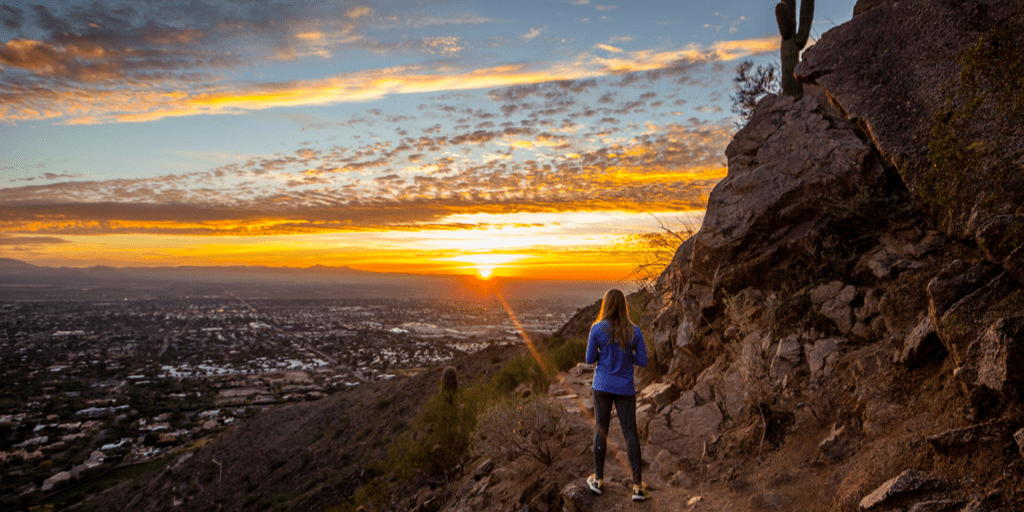Arizona is not only one of the sunniest places in the United States, but our state is also home to many unique and beautiful hiking trails. If you’re getting out of the house for some hiking, check out this guide for everything you need to know about how to keep yourself safe from the sun while you’re enjoying the sunshine!
Don’t forget the sunscreen
The most important item to make sure to stuff into your bag or purse is, of course, sunscreen! When deciding what sunscreen to pack, make sure to check those labels. The FDA released a study last year that six common active ingredients found in sunscreen are absorbed by our bodies through our skin. These chemicals can even stay in our bloodstream for up to 10 days! We asked Chief Dermatology Resident, Dr. Andrew Newman, to weigh in on this discovery. He stated,
“Generally speaking, the FDA states that it is important to apply sunscreens daily, regardless of how cloudy or sunny the weather. For now, the FDA has declared mineral sunscreens, like “Zinc oxide and Titanium oxide” to be safe for use. Other sunscreen ingredients should not be seen as dangerous, but further research of these other chemical sunscreen ingredients is needed to help clarify safety.”
As for recommendations for mineral sunscreens, Dr. Newman suggests his favorites to his patients: SkinMedica, Colorescience, Tizo, and Cerave. When looking for the perfect sunscreen, make sure that the SPF is at least 30 and that the skin protectant is broad-spectrum. Anything less than SPF 30, will not protect you enough from sun damage and you still might develop a sunburn. These options are also compact enough to throw in your bag to easily re-apply on your hike.
Sun safety around the eyes
Sunscreen has been scientifically-proven to significantly decrease sun damage and prevent the development of skin cancer. In fact, most people only apply 25% to 50% of what they actually need and they miss very important areas. One of the most common areas that are forgotten is the area around the eyes. The skin around your eyes is one of the thinnest and most delicate areas which can lead to the eyelid being more susceptible to skin cancer.
To make sure you never forget to apply sunscreen to your orbital area, check out Colorescience 3-in-1 Total Eye Renewal Therapy. This unbelievable product has a light tint in the formula to help visibly improve the appearance of dark circles, puffiness, fine lines, and wrinkles. The best part? This product contains SPF 35 and is safe to use on both the under-eye as well as on your eyelid. The Total Eye Renewal Therapy is also small enough to throw in your bag and go for easy reapplication every two hours while you’re out on the trail.
Block out the rays with shades
Sunglasses are not only fashionable but also act as a physical barrier to protect your eyes from the sun’s harmful rays. One thing to look for is to make sure your sunglasses have lenses that are polarized, dark in color, and that they block 99% to 100% of UVA and UVB rays. The polarization of lenses can help cut glare when you’re hiking so you never miss a step due to the sun. UV protection is the most important factor to look for in sunglasses. The more light that is allowed through the lens, the more damage you can cause to your eyes. This can include conditions such as skin cancer around the eye, sunburn, and potentially even cataracts. Dr. Andrew Newman stresses the importance of sunglasses to his patients,
“Glasses not only protect your eyes from harmful ultraviolet radiation from the sun but they also physically block sunlight for the skin around the eyes. UV proof lenses are ideal in sunglasses.”
If your shades don’t list any of these must-haves on their packaging, put them down, no matter how cute they may be, and find the best sunglasses for UV protection.
Sun protection from within
Slathering on sunscreen is only one way to prevent sun damage and skin cancer. We are excited to provide our patients with another way to protect themselves from the sun’s harmful rays with Heliocare. Heliocare is a dietary supplement that prevents sun and free-radical damage from the inside out. This powerful daily supplement uses Fernblock PLE technology to not only prevent damage but also to protect against the aging effects of sun damage. Heliocare is gluten-free, vegan, does not contain any artificial dyes, and is a natural way to boost your protection from the sun.
At our office, we are proud to offer our patients Heliocare Advanced. This deluxe formulation has both Fernblock PLE technology as well as a non-flushing form of Nicotinamide. Nicotinamide is a form of vitamin B3 that can minimize redness, blotchiness, and regulate the oil production in your skin. The best thing about Nicotinamide is that it can prevent sun damage by simultaneously rebuilding healthy skin cells while also protecting them from damage caused by ultraviolet rays. By adding this dietary supplement into your daily routine along with applying sunscreen, you can rest assured that your skin will be protected while enjoying the Arizona air.
Arizona’s landscape attracts tourists from all over the country to enjoy a hike while soaking up the Valley’s sunshine, so grab your essentials to stay sun safe while hiking. Make sure you’re protected this spring by always wearing sunscreen (and applying it everywhere, including your face), wearing sunglasses, and incorporating Heliocare into your daily routine.
If you have noticed any changes in your skin or looking for a sun-safe product recommendation, make an appointment to see one of our dermatology providers. We currently have eight offices across Arizona, including some that are conveniently located near McDowell Regional Park, Wonder Rift, and Phoenix Sonoran Preserve.



